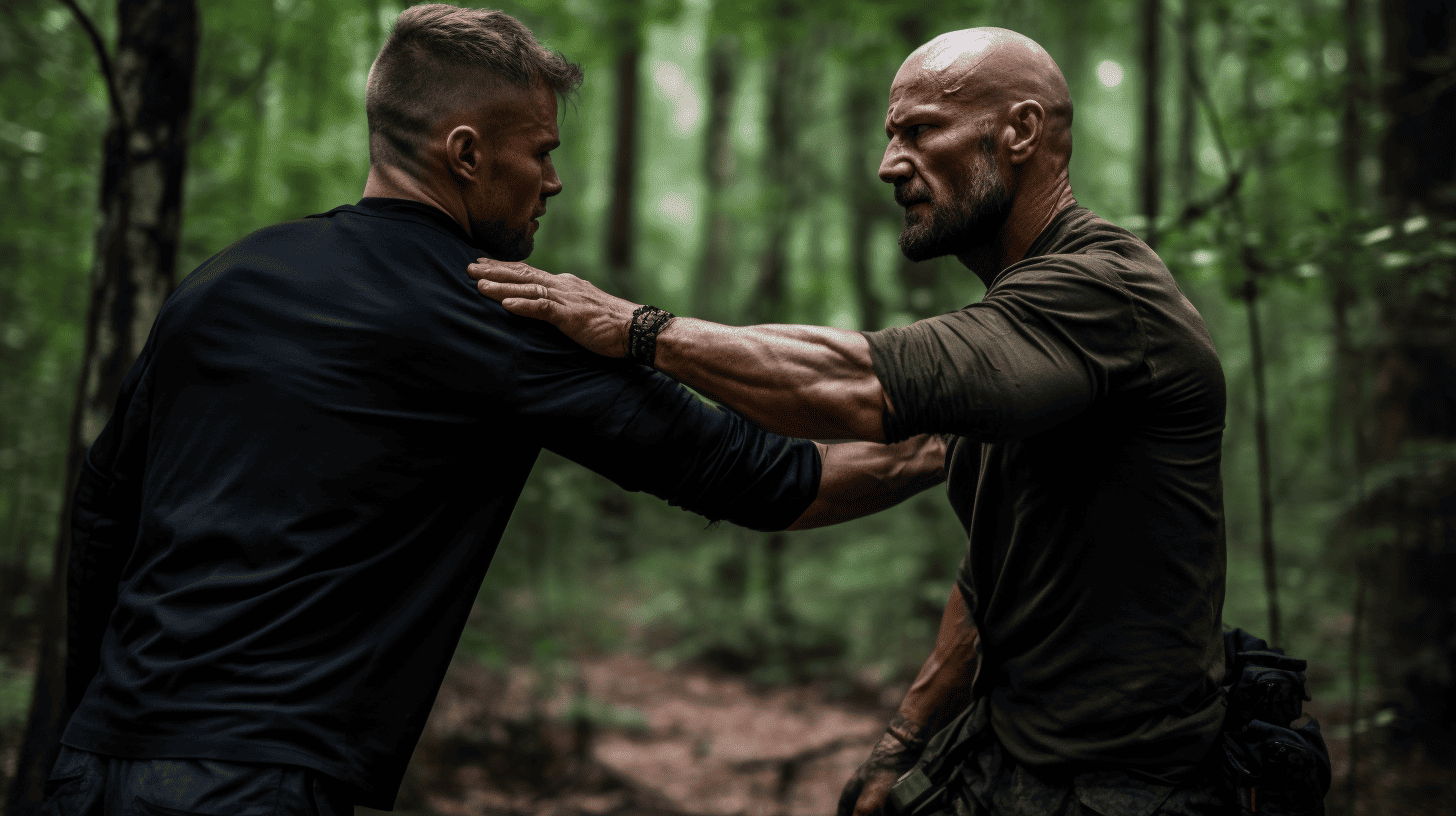Ever find your mind wandering to those ‘what if’ scenarios, where it’s you against the world and your personal defense in survival situations skills are all you’ve got? I know that feeling – it’s been my unexpected visitor a few times.
That very curiosity drove me to dig deep, to explore the core of survival instincts. This article is an attempt at sharing some invaluable insights gained along that journey. We’ll be uncovering nine reliable strategies for mastering personal defense – from harnessing mental strength to using technology to our advantage.
After all, when life throws us in uncertain territories, let’s not just aim for survival — let’s strive for triumph!
Key Takeaways
- Tenacity, adaptability, work ethic, creativity, positivity, acceptance, humor, bravery, and motivation are important aspects of mental fortitude in survival situations.
- Situational awareness and assessing potential threats are crucial for personal defense in survival situations.
- Real – life examples such as the rescue of tuna fishermen and encounters with bears highlight effective strategies for staying safe.
- Leveraging technology like real – time crime centers can greatly enhance personal defense capabilities in survival situations.
The Importance of Mental Fortitude in Survival Situations
Mental fortitude is crucial in survival situations, as it helps individuals maintain tenacity, adaptability, work ethic, creativity, positivity, acceptance, humor, bravery, and motivation.
Tenacity
In survival, tenacity stands tall. It means holding on when things get tough. You keep going, even when you feel like giving up. This grit is key to staying alive in bad times. Your body might be strong and able, but your mind calls the shots.
It’s said that survival is 90% mental and just 10% physical! With a firm willpower, you make smart decisions fast under stress. Strength inside helps you push through hard times without quitting out of fear or pain.
Adaptability
Adaptability marks the true survivor. It’s a trait linked to mental toughness. You need this skill to handle danger and defend yourself in hard times. Being adaptable means you can solve problems fast and stay calm when things change.
Flexibility is also part of adaptability. You have to think quickly, use what you find, and deal with stress well. This way of thinking helps make sure that you are ready for whatever comes next in your survival journey.
Work Ethic
A strong work ethic is key in survival situations. It means putting your all into everything you do. You can’t give up, no matter how tough things get. This mindset helps keep you going when the odds are against you.
Think about it like this: if you’re stuck in a forest, you need to build a shelter and find food and water every day. That’s hard work! But with a solid work ethic, these tasks become more manageable.
You push through no matter what obstacles come your way because survival depends on it. Grit and steadfastness fuel an unyielding desire to overcome challenges, making each success sweeter and worth the effort.

Creativity
Creativity is extremely important in survival situations. When faced with chaos and uncertainty, being able to think creatively allows us to adapt and find solutions to the challenges we encounter.
Having a positive mindset and being resourceful are key elements of creativity that help us navigate complex situations and come up with innovative problem-solving strategies. By cultivating our creative abilities, we can enhance our mental toughness and resilience, enabling us to thrive even in the most challenging circumstances.
So remember, embracing creativity can be a game-changer when it comes to survival.
Positivity
Positivity is a crucial aspect of mental fortitude in survival situations. Research has shown that positive thinking and emotions can greatly contribute to successful survival outcomes.
When we maintain a positive mindset, it helps us think more broadly and creatively, increasing our chances of finding solutions in difficult situations. Additionally, having high self-esteem from a positive outlook can improve our overall health and social lives while protecting against mental health issues.
Positive emotions have also been linked to successful work outcomes, strong social relationships, and better physical health. So, by cultivating positivity, we can enhance our emotional wellbeing and strengthen our ability to navigate challenging survival scenarios with resilience and optimism.
Acceptance
Acceptance is a crucial aspect of mental fortitude in survival situations. It involves acknowledging and embracing the reality of your circumstances, no matter how challenging they may be.
When faced with a survival situation, accepting the situation allows you to focus on finding solutions and taking action rather than dwelling on what could have been or feeling overwhelmed by fear and panic.
Acceptance also helps you conserve energy and make rational decisions based on your present circumstances. In life-or-death situations, having the acceptance to adapt and endure can greatly increase your chances of survival.
So remember, acceptance is not about giving up; it’s about facing reality head-on and using that knowledge to navigate through tough times.
With acceptance comes resilience – the ability to bounce back from setbacks and keep going despite difficult conditions. Resilience enables you to maintain inner strength even when faced with adversity or danger.
Humor
In survival situations, having a sense of humor can be an important tool for mental fortitude. It can help us cope with stress, improve our psychological wellbeing, and reduce the negative effects of difficult situations.
Humor acts as a defense mechanism and coping mechanism that allows us to find the funny side of things and provide some relief in challenging times. Studies have shown that laughter therapy has positive physiological effects on our bodies, boosting our immune system and reducing pain.
However, it’s important to note that the use of humor may vary across different cultures and individuals, so what works for one person may not work for another. Overall, developing a sense of humor can be beneficial in maintaining resilience during survival situations.
Bravery
Bravery is a crucial aspect of mental fortitude in survival situations. When faced with challenging circumstances, it takes courage and resilience to overcome fear and act boldly. In fact, studies among sport sciences students have shown that those with higher levels of mental toughness also tend to display greater bravery.
Our minds are powerful tools that can enable us to face emergencies head-on with strength and determination. So, when it comes to personal defense in survival situations, having the bravery to take action can make all the difference.
Motivation
Motivation is crucial in survival situations because it helps us stay determined, resilient, and courageous. It gives us the mental strength to persevere and endure challenges. In personal defense scenarios, motivation plays a vital role in our decision-making process and ability to take action.
With inner strength and self-discipline, we can overcome obstacles and keep going even when things get tough. So remember, staying motivated is key when it comes to excelling in survival situations.
Stay focused on your goals and keep pushing forward with unwavering determination.
Basics of Personal Defense in Survival Situations

In survival situations, knowing the basics of personal defense is crucial for your safety. These are the fundamental skills and techniques that can help you protect yourself in dangerous encounters.
Situational awareness is key – always be aware of your surroundings and any potential threats. Assess the situation quickly and accurately to determine the best course of action. This could involve finding a safe place to hide or creating distance between yourself and the threat.
Finally, take defensive actions if necessary, such as using self-defense techniques or calling for help. Remember, being prepared and proactive can make all the difference in a survival situation.
threat assessment,
defensive actions,
self-defense techniques,
dangerous encounters,
environment familiarity
Real-life Examples of Personal Defense in Survival Situations
Learn from real-life stories of personal defense in survival situations, including the inspiring rescue of tuna fishermen in the Pacific and a Montana man’s harrowing encounter with a bear.
These gripping accounts will provide valuable insights into effective strategies for staying safe and thriving in challenging circumstances.
Tuna Fishermen’s Rescue in the Pacific
I want to tell you about a real-life example of personal defense in a survival situation. It happened in the Pacific Ocean when an Australian man named Tim Shaddock and his dog Bella got stranded at sea for three months.
They were rescued by tuna fishermen who were out on their boat. Tuna are very valuable fish, but their population is threatened due to overfishing and other problems like bycatch and pirate fishing.
These fishermen played a crucial role in saving Tim and Bella’s lives.
Montana Man’s Bear Attack
During a hunting trip in Montana, two men found themselves face-to-face with a charging mama grizzly bear and her cub. Startled by the encounter, they quickly realized their lives were at risk.
In self-defense, they made the difficult decision to shoot and kill the bear before it could harm them. The incident highlights the importance of being prepared for wildlife encounters in outdoor settings.
Understanding grizzly bear behavior, following bear hunting regulations, and taking safety precautions can help minimize the chances of such harrowing incidents occurring. It’s crucial to always be aware of your surroundings and take steps to protect yourself when venturing into bear country.
Fisherman’s Grizzly Bear Self-Defense
One of the real-life examples of personal defense in survival situations is a fisherman’s encounter with a grizzly bear. Grizzly bears can be dangerous if they feel threatened or if their cubs are at risk.
In this situation, it’s crucial to stay calm and avoid any sudden movements that may provoke the bear. It’s also important to try and create distance between yourself and the bear by slowly moving away from it.
If the bear charges towards you, using bear spray can be highly effective in deterring or stopping its attack. Bear spray is easy to use and doesn’t require much experience. However, there is an ongoing debate about whether bear spray or a gun is better for defending against bear attacks.
Leveraging Technology for Personal Defense
In this section, we’ll explore how technology can be a game-changer when it comes to personal defense in survival situations.
Utilizing Real-Time Crime Centers
Real-time crime centers are a game-changer when it comes to personal defense in survival situations. These centers use advanced technology to improve how law enforcement responds to crimes and emergencies.
By bringing together information and utilizing large video walls for command and control, real-time crime centers enhance situational awareness for officers on the ground. This means quicker response times, better coordination among different agencies, and more effective crime prevention strategies.
So, when it comes to staying safe in survival situations, leveraging these centers can make a significant difference in ensuring your personal defense is top-notch.
Crisis Communications in Law Enforcement
In law enforcement, crisis communications play a critical role in ensuring public safety and effective emergency response. It is important to have clear communication strategies in place to prevent panic and confusion during crises.
Technology has greatly improved the way law enforcement agencies handle emergencies, allowing for real-time information sharing and better coordination among officers. However, it’s crucial to protect personal privacy while integrating technology into policing tactics.
Mental health support is also essential for officers dealing with high-stress situations, as it helps maintain operational effectiveness and overall well-being. By leveraging technology and implementing effective crisis communication strategies, law enforcement agencies can enhance their ability to respond to emergencies and keep the community safe.
Addressing Police Culture and Public Perception
As a survival enthusiast, it’s important to understand the role of police culture and public perception when it comes to leveraging technology for personal defense in survival situations.
Technology plays a significant role in shaping policing strategies and decision-making processes. Information technology provides valuable data and insights that help law enforcement officers perform their duties more effectively.
However, there are challenges that arise when incorporating technology into crime prevention efforts. Police culture can sometimes be resistant to change, making it difficult to adopt new technological innovations.
Additionally, public perception of law enforcement can impact the willingness of communities to embrace new technologies.
It is crucial for law enforcement agencies to address these challenges by promoting a positive police culture that values innovation and embraces technological advancements. By engaging with the community and promoting transparency, trust between law enforcement and the public can be strengthened.
This helps create an environment where the benefits of using technology for personal defense in survival situations are recognized and accepted.
Mental Health Professionals in Police Calls
In survival situations, the role of mental health professionals in police calls is crucial. They play a significant part in leveraging technology for personal defense. It’s important for law enforcement officers to receive comprehensive training on the risk factors associated with their job and the culture of policing.
By educating mental health professionals about these unique challenges, including third-party providers, they can better understand and support law enforcement officers during crisis situations.
Effective communication is also key, as public officials need to deliver messages that inform without causing unnecessary fear. The National Guidelines for Behavioral Health Crisis Care provides helpful tools and resources to support crisis care in the field.
Wellness Principles for First Responders
Taking care of your physical and mental well-being is crucial in survival situations. Learn how to maintain extreme ownership, prioritize safety and wellness, and develop the necessary leadership skills to excel as a first responder.
Read more –>.
Extreme Ownership
In survival situations, extreme ownership is a mindset that can greatly benefit personal defense. It means taking complete responsibility for your actions and decisions. This concept comes from the book “Extreme Ownership” written by Jocko Willink and Leif Babin, both US Navy SEALs.
They share 12 leadership principles that apply to various aspects of life, including personal defense. By adopting extreme ownership, you take control of your own safety and well-being in survival situations.
It helps you make better decisions, overcome challenges, and develop effective strategies and tactics for survival.
Safety and Wellness
As a Survival Enthusiast, taking care of your safety and wellness is crucial in any survival situation. It’s important to prioritize both your physical and mental health to stay strong and resilient.
This includes keeping up with occupational health practices like stress management, work-life balance, and proper sleep hygiene. Taking care of your nutrition and staying physically fit are also essential for overall well-being.
Additionally, learning coping skills and emotional survival training can help you handle stress better and enhance your overall wellness as a first responder. Remember, prioritizing safety protocols and maintaining self-control are key elements in personal defense during survival situations.
Training and Career Development for Personal Defense
Discover the essential police rookie success tips, crisis negotiation skills, and Army leadership principles to excel in personal defense. Read more to enhance your training and career development for survival situations.
Police Rookie Success Tips
As a survival enthusiast, I know that being a police rookie can be challenging. So, here are some tips to help you succeed. First and foremost, your training is key. Make sure to pay attention and take it seriously because it will shape your skills and knowledge.
Situational awareness is also crucial for rookie cops – always stay alert and observe what’s happening around you. Another important tip is conducting mental rehearsals before potential emergencies – this can help you respond effectively in high-pressure situations.
Additionally, learning pre-attack indicators can give you valuable insight into potentially dangerous situations. Lastly, regular equipment checks are essential for keeping yourself prepared and ensuring your safety on the job.
Crisis Negotiation Skills
Crisis negotiation skills are crucial for personal defense and survival situations. These skills come from crisis negotiation and hostage negotiation scenarios, which can teach us valuable techniques for conflict resolution and deescalation.
With strong communication skills, active listening, and empathy, crisis negotiators can diffuse tense situations by understanding the emotions of those involved and building rapport.
By employing effective negotiation strategies and crisis management techniques, they aim to resolve volatile situations without any loss of life. If you’re interested in learning more about crisis negotiation skills, the National Tactical Officers Association offers training courses that cover essential concepts and provide best practices in this field.
Red Team Handbook
The Red Team Handbook is a valuable resource for training and career development in personal defense during survival situations. It’s published by the US Army Combined Arms Center and contains practical guidance for individuals and teams.
This handbook, consisting of 238 pages, provides tactical techniques, security strategies, threat assessment, risk management, and intelligence gathering skills. It also includes a list of helpful tools and key questions to consider.
If you’re looking to enhance your survival skills and become better prepared for any situation, the Red Team Handbook is an essential read that will help you excel in personal defense.
Army Leadership Principles
As a survival enthusiast, it’s important to understand the principles of leadership that are followed in the Army. These principles are essential for successful leaders who need strong intellect, physical presence, and professional competence.
It’s also crucial for them to have moral character and act as role models. Values play a significant role in guiding leaders to make ethical decisions. The Army emphasizes twelve key principles of modern military leadership, including leading from the front, self-confidence without egotism, and having strong moral character.
By studying these principles, we can gain knowledge about how facts, ideas, and principles relate to each other in a structured way. This understanding can help us become better leaders in survival situations too.
Maintaining Self-Control and Communication in Survival Situations
In survival situations, it is crucial to maintain self-control and effective communication skills for ensuring personal defense and safety.
Situational Awareness
Maintaining situational awareness is crucial for personal defense in survival situations. It involves being alert, vigilant, and observant of your surroundings. By paying attention to the details and staying mindful, you can better perceive any potential dangers or threats.
Situational awareness allows you to respond quickly and effectively, increasing your chances of success in defending yourself. Good communication techniques are also important for maintaining situational awareness, as they help you share information with others and gather valuable insights from them.
By practicing situational awareness and staying attentive, you can enhance your personal defense strategies and navigate survival situations with greater acuity and confidence.
Effective Communication
Effective communication is incredibly important in survival situations, especially when it comes to personal defense. It can help you stay calm and focused, make quick decisions, and work together with others.
By practicing good communication techniques, such as clear and concise speaking, active listening, and using nonverbal cues effectively, you can ensure that vital information is understood and acted upon quickly.
Situational awareness goes hand in hand with effective communication – being aware of your surroundings allows you to communicate more efficiently about potential threats or changes in the situation.
Overcoming Self-Sabotage
Self-sabotage can hold us back in survival situations, but we have the power to overcome it. It happens when our internal world gets comfortable with negativity and self-doubt. To excel in overcoming self-sabotage, we need to develop emotional regulation skills and find healthy coping mechanisms.
Taking care of our mental health and fostering personal growth are important too. Building resilience and emotional intelligence will help us stay focused and avoid self-sabotaging behavior.
Remember, we have the strength within ourselves to overcome any doubts or fears that may arise. Trust in your abilities and keep pushing forward.
Family and Home Preparedness for Personal Defense
Learn how to establish a public servant guardian mindset and switch departments in law enforcement for enhanced family and home preparedness. Dive deeper into the importance of personal defense strategies in survival situations by reading the full blog post.
Establishing a Public Servant Guardian Mindset
To excel in personal defense during survival situations, it is crucial to establish a public servant guardian mindset. This means being prepared to protect yourself, your family, and your home in times of crisis.
By developing a proactive approach, you can minimize risks and maximize safety. It involves creating a comprehensive defensive plan and staying informed about potential dangers. By studying discrimination or denial of equal protection of the laws under the Constitution, you can better understand how to defend yourself and others effectively.
Remember that family and community disaster preparedness plays a significant role in achieving overall resilience. Stay vigilant, be ready to act swiftly when necessary, and prioritize the safety of those around you by establishing this guardian mindset.
Switching Departments in Law Enforcement
Switching departments in law enforcement can be a significant decision for officers and their families. It’s important for law enforcement agencies to prioritize the personal and family life of their officers while also considering their commitment to serving the community and protecting the public.
In Chaska Police Department, for example, there is a code of ethics that guides officers in these areas. When switching departments, it’s crucial to consider how it will impact your personal and family life, as well as ensuring that you adhere to the code of ethics wherever you go.
Additionally, having knowledge about emergency operations plans (EOP) and preparedness can be beneficial in survival situations both on and off duty. Following guidelines like Comprehensive Preparedness Guide 101 can help develop effective EOPs that address potential risks or threats.
Additional Resources for Personal Defense
Explore professional organizations and standards, as well as recommended books and courses, to enhance your personal defense skills and knowledge. Dive deeper into the world of survival with these valuable resources.
Professional Organizations and Standards
Joining professional organizations is a valuable way to enhance your personal defense skills and prepare for survival situations. These organizations offer membership, training, certification, and resources to help you develop self-defense skills and stay up-to-date with industry standards.
By joining these organizations, you can network with other survival enthusiasts and learn from their experiences. You can also access guidelines and best practices that will guide you in personal defense strategies.
So consider becoming a member of professional organizations in order to improve your preparedness for survival situations and expand your knowledge in the field of personal defense.
Recommended Books and Courses
One of the books I highly recommend for personal defense in survival situations is “Principles of Personal Defense” by Jeff Cooper. This book provides valuable insights on different aspects of self-defense, including mindset, tactics, and situational awareness.
It can help you develop a strong foundation and improve your overall preparedness. Additionally, there are articles available that discuss the top 10 defense mechanisms and how to overcome them.
These resources can provide crucial knowledge on psychological defense mechanisms and strategies to overcome obstacles in survival situations. Furthermore, books and courses focusing on communication techniques can greatly enhance your effectiveness in personal defense scenarios.
Conclusion on Personal Defense in Survival Situations
In conclusion, excelling in personal defense in survival situations requires mental fortitude and the ability to adapt. By utilizing the tips and tactics provided in this article, you can enhance your chances of survival and protect yourself and your loved ones.
Remember to stay positive, be creative, and maintain a strong mindset during challenging times. With these strategies in place, you can excel in personal defense and navigate any survival situation with confidence.
FAQs on Personal Defense in Survival Situations
1. What are some personal defense techniques to excel in survival situations?
Some personal defense techniques to excel in survival situations include learning self-defense moves, carrying a whistle or personal alarm for attracting attention, using improvised weapons like sticks or rocks, and being aware of your surroundings.
2. How can I stay safe during a survival situation?
To stay safe during a survival situation, it is important to be prepared by having a plan and necessary supplies, staying calm and focused, avoiding unnecessary risks or confrontations, and seeking help or finding shelter if possible.
3. Can anyone learn personal defense for survival?
Yes, anyone can learn personal defense techniques for survival. Taking self-defense classes or workshops can provide valuable skills and knowledge in protecting oneself during emergencies.
4. Is it important to have self-defense tools in a survival kit?
Having self-defense tools such as pepper spray or pocket knives can be helpful in certain situations; however, they should only be used responsibly and within the legal limits of your area.
5. How do I prioritize my safety when faced with multiple threats in a survival situation?
When faced with multiple threats in a survival situation, it’s essential to prioritize your safety by assessing the level of danger each threat poses and taking appropriate action based on the immediate risk to ensure your well-being.





Leave a Reply